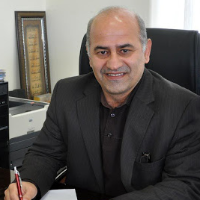Identifying the components of the green university in the context of the fifth generation university paradigm
The purpose of this research is to identify the components of the Green University in the context of the fifth generation university paradigm.
Qualitative research method is a hybrid type. The statistical community includes articles related to the topic that were published in SID, Science Direct, Irandoc, PubMed, Iranmedex, Google scholar databases. And the sampling method was purposeful, based on predetermined criteria, suitable articles that were published in both English and Farsi languages in the field of the components of Nesl-5th University and Sabez University were selected and the content of the articles was selected. They were carefully studied and analyzed, and a total of 37 articles were identified, of which 8 articles were used in the final analysis. The data collection tool is the STROBE checklist. Data analysis was done using thematic analysis. First, basic concepts were extracted and then basic concepts, first-level and second-level concepts were extracted.
Based on the data analysis, 210 concepts were extracted, and these concepts were categorized into 57 categories and finally 6 main categories, which include university governance, culture of fifth generation organizations, three pillars of sustainability, green education, green research. and the relationship between the university and the society, was extracted as a model for the configuration of the green university.
Conclusions and suggestions:
The paradigm of the fifth generation university can be a suitable platform for the reconfiguration of the green university. The fifth generation university has a local environment in which it is possible to provide opportunities for green innovations and, consequently, a green university. Green University is a way for the university to be responsive to the society and shows the social responsibility of the university for sustainable development.
-
Application of Fuzzy Hierarchy Analysis method to identify factors on the professional development of newly graduated teachers from Farhangian University
Nader Habibzadeh, Ebrahim Salehiomran *, Saeed Ghiyasinoshan
Journal of Management and educational perspective, -
Organizing advanced skill trainings: integration and aggregation of technical and professional university and applied scientific university
*
Journal of Educational Planning Studies, -
Systematic Review of Five Spiral Model for Fifth Generation University
, *, Zinab Karamkhani
Journal of Science & Technology Policy, -
Relationship between Spiritual Health and Quality of Life in University Students of Arak City
Ali Jadidi, , Ali Khanmohamadi Hezave, Negin Hosseini*
Journal of Arak University of Medical Sciences, -
Identify Components of Cultural Education and Its Relationship with Collective Communication Media (With an Emphasis on Virtual Space )
Mehran Karimi Firoozjaei, Hakimehalsadat Sharifzadeh *,
Education Journal, -
Designing Professional Consulting Model in Iran's Universities
*, Soheila Hashemi, Yadollah Mehralizadeh, . Ebrahim Salehi
Iranian Higher Education,




